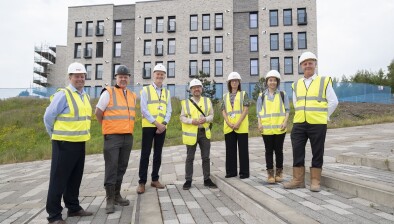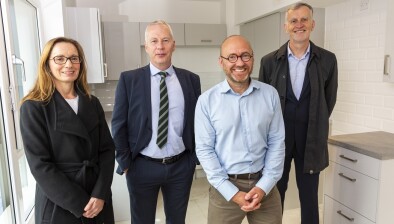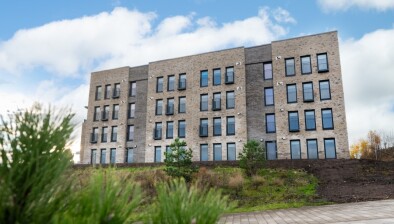WSHA begins work on Scotland’s largest Passivhaus development
Brian Gannon, Andrew Kubski and Councillor Kenny McLean (Iain McLean Photography)
West of Scotland Housing Association (WSHA) has started construction of Scotland’s largest Passivhaus development which will see 90 highly energy efficient homes created for mid-market rent.
The £21 million project, located in Dundashill in Glasgow, is the first development on-site as part of wider masterplan to regenerate the area.
The homes will be built to Passivhaus standard and will be low carbon by utilising air source heat pump technology which reduces the building’s carbon footprint and contributes towards the Scottish Government’s target for emissions from heating buildings to reach net zero by 2045. These ultra-low energy building require little energy use for heating or cooling which means very low energy use for tenants.
Funded by a £10.1m of grant from Glasgow City Council and £11.1m of WSHA’s private finance, construction is now underway by CCG (Scotland) Ltd with the homes expected to be complete in late 2023. Once complete, the homes will be managed by Westscot Living (a subsidiary of West of Scotland Housing Association) and consist of a mix of 1 to 3-bedroom flats with high-quality landscaping, urban play area and exceptional views overlooking the city.
This development is part of a wider regeneration of the former Diageo Distillery site. Scottish Canals, with funding support from City Deal, has created six development plots across the site.
Andrew Kubski, director of development and asset management at WSHA, said: “This fantastic development demonstrates that delivering quality housing takes tremendous patience and resilience – it has taken us 4 years to get on site. Needless to say I am absolutely thrilled to now be on site constructing at pace our second affordable Passivhaus development which is the largest of its kind in Scotland. It will create much needed high quality affordable mid market homes close to Glasgow city centre. The new Passivhaus homes will be created to achieve one of the highest standards of energy efficiency and this will lead to lower fuel usage for tenants and help to address fuel poverty.”
Councillor Kenny McLean, convener for Housing at Glasgow City Council, added: “This is a significant housing development for Glasgow in a number of ways. Not only will these homes require less energy, reducing emissions and help the city meet our Net Zero targets, but it marks a new stage in the regeneration of North Glasgow as Dundashill becomes the latest area there to see homebuilding begin. Given its significance, the council is pleased to help fund these new homes on the canal corridor.”
CCG managing director, David Wylie, added: “CCG are extremely proud to be delivering Scotland’s largest Passivhaus development on behalf of West of Scotland Housing Association. Passivhaus, through a combination of enhanced fabric performance and energy saving measures, drastically reduces heat loss and as a result, minimises annual fuel bills for the occupier.
“At a time when the cost of energy has reached unprecedented levels for people across Scotland, the significance of this development cannot be understated given its scale in addressing affordable housing supply in the city of Glasgow as well as the wider fuel poverty and carbon agendas. The support provided by Glasgow City Council and investment from West of Scotland is to be commended and we look forward to bringing Dundashill forward to completion in 2024.”







